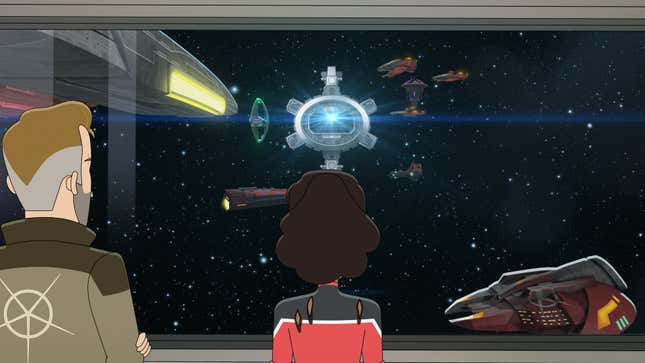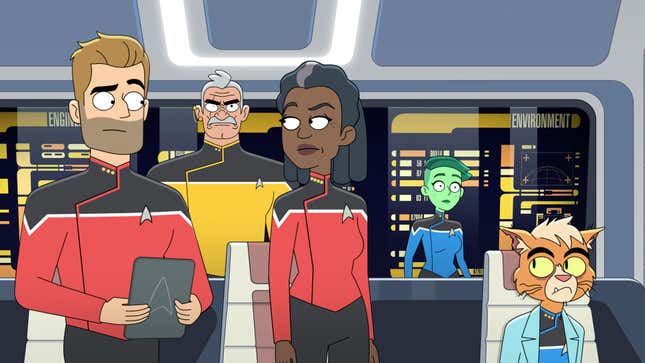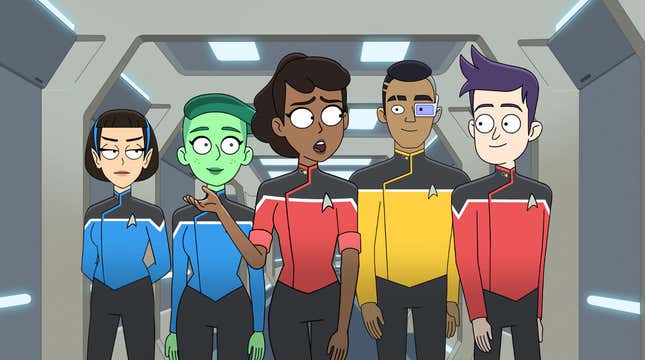After a third season that felt like spinning its wheels, so far season four of Star Trek: Lower Decks has made a great effort on pushing all of its characters to grow and change, and to better reflect the arcs we’ve seen them go on. In its season finale, the show sends that journey off with a bang—one that feels like a fond farewell to one era for its heroes.

Advertisement
From the very get-go, “Old Friends, New Planets” feels like it builds on all the developments our heroes have made over this last season to prepare to say goodbye, in some ways, to this current version of the show: the version where our ensigns really were the scrappy underdogs still trying to figure out what they were doing, and what they were really capable of. We’ve seen them come into their own over the last four seasons, and especially so in this most recent one as they’ve become Lieutenants Junior Grade—now, tasked with saving Mariner and stopping Nick Locarno’s plans for a rogue “Nova Fleet,” a misguided coalition born out of his fatal mistake at Starfleet Academy, we get to see them put all that to the test. And by god, do they pass with flying colors.
Advertisement
At the core of this, of course, is Mariner—who really shines in this episode after last week saw her come to terms with her deep-rooted fears about what it means to be a Starfleet officer, a leader, having come of age during the Dominion War. Just as it was in the closing moments of last week’s episode, it’s like a switch has flipped within her. The confidence, the style, the charisma, and the determination practically ooze off her, made even more impressive by the fact that for much of the episode she’s flying solo from the moment she figures out she has to stop Locarno and the rogue Genesis Device he intends to use as a bargaining chip to rally even more “Lower Deckers” to his cause.
Advertisement

That idea in and of itself is very interesting—Locarno, scorned by Starfleet for not following their rules and getting a fellow student killed, still longs for the sense of belonging Starfleet gave his young life, he just doesn’t want any of the rules and regulations that cast him out for it. It’s perfectly immature for someone who’s not been able to grow up from the mistakes of his young adulthood: on the surface, it’s an interesting commentary on the socialist utopia of the Federation and galactic civilization at large, yet a utopia dominated by bureaucracy and restrictions and protocols. But that’s all it is, surface level critique. The second things don’t go Nick’s way his egalitarian desires go out the window as he tries to claim leadership, where his word is law.
Advertisement
He thinks he wants a fleet of Beckett Mariners at his side—anti-authoritarian rulebreakers who get the job done, consequences be damned. But in offering that to Mariner, he not only fails to realize what a terrible idea that is, blinded by his desire for vengeance, he fails to realise Mariner has been changed by the Starfleet experience she got and he didn’t. She is the mirror to what Nick could’ve been if he didn’t try to cover up the accident, a capable officer who knows Starfleet is flawed but is mature enough to realize that it won’t change by lashing out at it—by meeting command on its own terms and pushing it to grow along with her from within. It’s fascinating to put what could’ve easily been Mariner a few seasons ago into the body of the very antagonist of the whole season: the embodiment of this faux-collective, thumb-biting anti-authoritarianism as a front for deep seated personal issues. And Beckett doesn’t just overcome it in standing up to Locarno, she absolutely rejects it.

Advertisement
It’s not just Mariner that we get to see this evolution in across the episode, either. While she hides the Genesis Device away from Locarno and his forces, the Cerritos races against the clock to break her free and get through Nova Fleet’s Trynar shielding. After a trip to Orion to make a deal with Tendi’s sister to get a starship payload big enough to penetrate the shield (more on that in a bit), we get Brad Boimler in the captain’s chair. In an absolutely brilliant moment, it’s Boimler who leads the charge at the shield, as the bridge officers prepare to take the Captain’s Yacht past the shield, once Boimler and the Cerritos tractor-slingshot their Orion battleship gift at it. Like Mariner, he feels like a changed person in this moment, not gleeful or nervous, but confidence, inspiring, and commanding, building on the lessons he learned from T’Lyn earlier in the season. And it’s so good.
And thus, the day is saved: Captain Freeman and her officers break through and rescue Mariner, Nova Fleet crumbles as Nick tries to strongarm his way, and in his blind anger he refuses Mariner’s chance to come with them and atone, dying trying to disarm the Genesis Device as it erupts, transforming the nebula it and Nick were trapped in into a new world. Everyone’s happy, Mariner apologizes for how she first tried to process her anxieties, the Cerritos is recognized by Starfleet as the heroic crew it deserves to be seen as… but there is a cost, of course. In exchange for the Orion battleship, Tendi made the decision to offer her sister something she wouldn’t refuse: herself, putting Starfleet behind her to return to Orion and her family’s crime syndicate, giving us our season cliffhanger as Tendi is torn away from her friends and the Cerritos to head home.
Advertisement

This too is similarly reflective of how far Tendi has come this season, that she leaves the Cerritos determined rather than distraught, confident she’ll find her way out from under her sister’s thumb and head back to where she wants to be. But at the same time, this is already a little similar to a cliffhanger we already saw the show pull with Boimler and the Titan in seasons one and two, something that got quickly swept aside, so it’s hard to really see just how interesting this scenario will play out yet. Hopefully, given that both Tendi and Rutherford—who arguably remain Lower Decks’ least-explored characters, even now with T’Lyn on board—did get some good character progression this season, the potential of keeping them apart for a potentially extended period of time will let Lower Decks explore the both of them on their own, which has a lot of promise.
Advertisement
And that promise is really what makes “Old Friends, New Planets” shine. Having Locarno represent the sort of scrappy underdog status that has defined Lower Decks at this point, and throwing him directly at characters who have spent a season growing and adapting to new responsibilities, only for him to fail resoundingly feels in part like the show is trying to bid farewell to the version of itself that could be extrapolated into Nick’s exaggerated villain. Its heroes are Ensigns no more, the Cerritos isn’t seen as a joke by Starfleet Command: it genuinely feels like we’re entering a new era for Lower Decks. One that’s still earnestly loving and jokey about Star Trek, and how much it cares for the series’ silliest sides, but one that’s also matured itself over these four seasons—where it’s truly earned its place among the canon of the franchise, instead of being a scrappy upstart.
Star Trek: Lower Decks is streaming now on Paramount+.
Want more io9 news? Check out when to expect the latest Marvel, Star Wars, and Star Trek releases, what’s next for the DC Universe on film and TV, and everything you need to know about the future of Doctor Who.
Services Marketplace – Listings, Bookings & Reviews